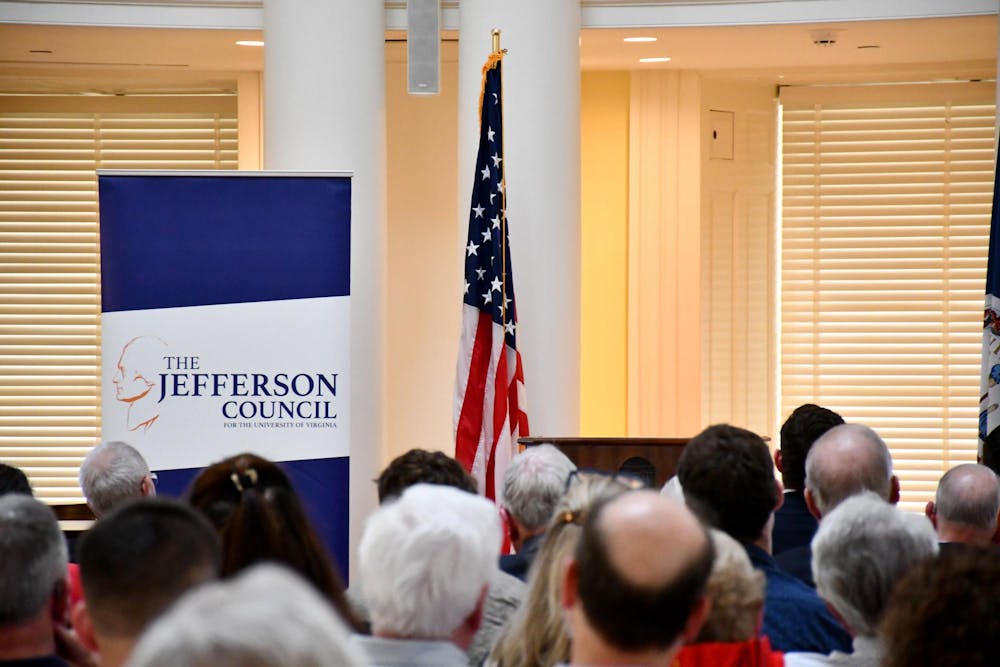There exists a kind of unwritten contract between a university and its alumni. Alumni are a valuable resource for our community — they donate money towards the perpetuation of the University, provide valuable professional connections and contribute to our sense of community and school spirit. In return, the University recognizes them as a significant stakeholder in its decisions and developments, in concert with students and faculty. But what is happening today — politically motivated alumni dominance over the University’s other stakeholders, culminating in former University President Jim Ryan’s resignation — was not a part of the deal. We can no longer overlook the burgeoning trend of major University decisions that are unpopular among students and faculty being made at the urging of alumni who are largely unaffected by these decisions’ consequences.
It may not come as a total surprise that a university’s alumni would differ politically from its current members. This is particularly true for a southern school like the University, which has become far more demographically, socioeconomically and politically diverse over the past fifty years. However, we cannot simply cast this aside as an unavoidable generational divide considering the immensely consequential subject matter of this disagreement. Nor should we be willing to accept that when we fundamentally disagree with alumni, they — as the stakeholder with the least current connection with the University itself — should be the most powerful party. As this tug-of-war between alumni and the student-faculty group becomes an apparent trend, it is concerning that students and facuty are consistently on the losing end.
The balance of stakeholder power is undoubtedly difficult to strike. But in a situation where students and faculty are broadly united in opinion, dissenting alumni should not take precedence. In recent years, some alumni of the University have lost perspective on the limits of this relationship. This year the Jefferson Council, a conservative alumni group, launched its massive “ResetUVA” campaign targeting central features of the University. This includes attempting, largely successfully, to oust the University’s leadership, end its diversity, equity and inclusion practices and reform its Honor System. Furthermore, Ryan’s resignation was ultimately the result of immense pressure from the U.S. Department of Justice — pressure which has been attributed to two University alumni, lawyers Gregory Brown and Harmeet Dhillon. Recently, not only has alumni input on University matters proliferated, but this input is also very consistently coming to fruition.
Make no mistake — the Trump administration deserves the bulk of the blame for Ryan’s ousting. But it seems unlikely that such a unique action would have even been on the federal radar were it not for tireless platforming by influential alumni, particularly Washington insiders like Brown and Dhillon. Regardless of the extent to which alumni efforts genuinely influenced the federal action against Ryan, this action has at least indisputably uncovered a pervasive desire among alumni to enact drastic changes to the policies and leadership of their alma mater, with little regard for the widespread dissent of students and faculty.
To redefine the balance of stakeholder influence, changes are necessary — some simply procedural, others less tangible. To begin with, instances of shared governance must be built more equitably. Most obvious is the recently-formed presidential search committee. Of the members searching for the University’s next president, only three are students — only one undergraduate — and only seven are professors. Meanwhile, of the remaining members alone, 13 are alumni. With minimal effort, the University could have affirmed the value of student and faculty perspectives by appointing a more proportionally balanced committee. But as long as these types of institutions with real decision making influence remain overwhelmingly in alumni hands, any suggestion that other stakeholders’ voices are being appropriately considered cannot be taken seriously.
But alumni influence will never simply disappear, nor should it. Any University requires a large degree of management and oversight — a Board of Visitors, for instance — and it is only logical that a majority of this top-down governance should come from alumni. However, to achieve equitable governance, the University requires from these alumni a reflection on the ethics and rationality of turning one’s alma mater into a personal political project. Alumni on the Board, the Jefferson Council or any other alumni organization would almost certainly claim to have only the University’s best interest in mind. But we, as the University’s current students and faculty, are a significant part of that University of which they speak. To act in opposition to the vast majority of students and faculty in the name of the University’s greater good is paradoxical and dismissive of our judgment.
We students, too, will eventually occupy the role of University alumni. Despite our future separation from the University, we will certainly care how our alma mater looks and what values it espouses. It would be unreasonable to ask current alumni to feel any differently. But what we can ask — of them and of our future selves — is to listen intently to student and faculty perspectives. Students, faculty and alumni will not always agree, but this cannot be grounds for alumni voices to drown out all other stakeholders. This University was built on student self-governance, and a University governed by alumni cannot stand.
Nathaniel Carter is an opinion columnist who writes about health, technology and environment for The Cavalier Daily. He can be reached at opinion@cavalierdaily.com.
The opinions represented in this column are not necessarily those of The Cavalier Daily. Columns represent the views of the authors alone.







